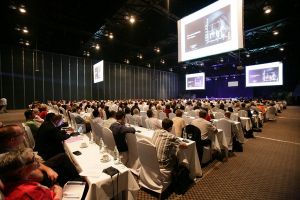 The future of work has never been such a hot topic in business circles as it is today.
The future of work has never been such a hot topic in business circles as it is today.
Forbes, Fast Company and the Economist are just a few of the major media outlets dedicating significant space to the topic, no doubt because major change is afoot in today's workplaces.
The exponential pace of technological change is driving widespread shifts in where, when and how we work.
With economic and demographic shifts also at play, there's a lot to get your head around.
These shifts were the discussed at the recent Future of Work conference, which I attended. It was themed 'People, Place, Technology', and hosted by the Centre for Workplace Leadership in Melbourne.
The conference brought together leaders and innovators to share insights on how the world of work is changing.
Leading social commentator Bernard Salt focused Australia's changing demographics and relationship with technology. He talked about an increasing demand for flexible work by parents, older workers and Gen Y. He stated that "Telecommuting is the ideal Aussie lifestyle of the future", allowing workers to organise their work around their life.
Best-selling author Daniel Pink's presentation on Day Two was thought provoking. His view was that engagement is needed more than ever by today's organisations. By focusing on compliance, managers are using an outdated 'technology' that doesn't fit with the workforce of today. Leaders and managers should use purpose, mastery and autonomy to achieve greater engagement – essentially, by enabling their staff members to be self-directed.
Uncertainty formed a major part of the discussion: namely that the pace of change and the factors driving it are creating a future that is even less certain than the future previous generations anticipated – several presenters referred to this increasing uncertainty.
Futurist Chris Riddell outlined four key elements of the future of work: volatility, uncertainty, complexity and ambiguity. Bernard Salt stated "The skills you need for the workforce of the future is flexibility, fluidity..." - he didn't just mean more flexible work, but a more agile, versatile way of working where people can apply their skills in a range of areas.
With all this uncertainty, does that mean organisations need to be ready for change? Well, yes, but Dale Fisher, CEO of the Peter MacCallum Cancer Centre said it's time to throw out your books on managing change - that the future of work requires transformational change, not the types of change that organisations have been used to.
Collaboration was highlighted by many of the speakers: to prepare teams and whole organisations to 'connect the dots' in times of uncertainty. Simone Carroll, General Manager People and Brand at REA Group said that REA measures collaboration as it's an important objective in their business and CISCO General Manager Vaughan Klein outlined his view of collaboration: that collaboration is about enabling people to discuss, connect, share and recall.
I presented in a session, shared with Vaughan Klein and Dr Jesse Olsen, that looked at how to make virtual teams effective. I spoke about the leadership and management style needed for virtual teams and the future of work - where results are more important than effort. Only by managing by results can managers prepare themselves for a future that is more flexible about when, where and how work gets done.
I can't help thinking that the organisers left the best 'til last: a keynote by Frederic Laloux, author of Reinventing Organisations. While most managers today consider a good organisation to be like a good machine, Frederic Laloux believes that leaders are emerging who design their organisations to be more like a living organism: able to respond intelligently and immediately. He believes that we're entering a new, fundamentally different management model to what we've seen in the past. To find out more, hear him speak about reinventing organisations.
Leaders and managers today need to spend some time thinking about the way work is changing and planning for the future of work.
If you missed the Future of Work conference in Melbourne, it will be in Sydney on 4 June 2015 with a different theme: 'Culture, Values, Leadership'. I encourage you to attend if you can.
Nina Sochon
Nina Sochon is a leading expert on remote and flexible work in Australia and a High Performing Workplaces Consultant. Nina now assists businesses to drive amazing service outcomes and powerful staff engagement through a clear system of results management, effective leadership and highly productive remote and virtual work arrangements.